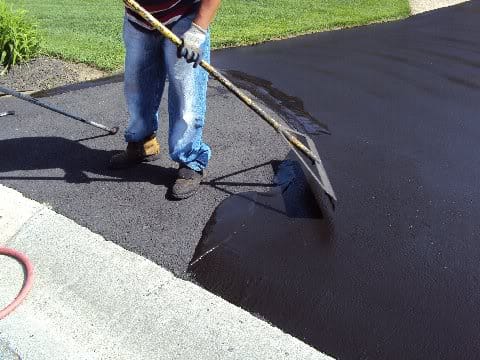Reliable Asphalt Repair: Cold Mix Sealing Techniques Unveiled
Reliable Asphalt Repair: Cold Mix Sealing Techniques Unveiled
Blog Article
Cold Mix Asphalt Vs. Hot Mix Asphalt: Which Is Right for You?

Composition Distinctions
Cold mix and hot mix asphalts vary dramatically in their structure, with distinctive attributes that influence their performance and applications. Cold mix asphalt is produced by emulsifying the asphalt binder with water and an emulsifying representative before mixing it with aggregate. This technique enables the asphalt to be workable at lower temperature levels, making it suitable for momentary repair services and for usage in chillier weather conditions. Warm mix asphalt, on the other hand, is produced at high temperature levels, commonly in between 300-350 ° F, which assists to accomplish much better compaction and a more sturdy final item. The hot mix asphalt production process involves heating the accumulation and asphalt binder independently before combining them at the asphalt plant.
Additionally, cold mix asphalt tends to be much less thick and much more versatile than hot mix asphalt. This versatility makes it much better suited for areas with higher degrees of movement, such as driveways or roadways with heavy web traffic. In contrast, warm mix asphalt is recognized for its high sturdiness and resistance to rutting and splitting, making it a favored option for freeways and high-traffic roads where durability is essential.
Installation Refine Variances
The process of installing chilly mix and hot mix asphalt exhibits remarkable variances in their treatments and needs. In contrast, warm mix asphalt demands an extra sophisticated installation process. Due to the heating needs, warm mix asphalt installations are typically carried out by experts with specialized devices, making certain an extra irreversible and structurally sound result.
Sturdiness and Longevity Aspects
When taking into consideration asphalt alternatives, sturdiness and durability are vital aspects to review for enduring pavement efficiency. Warm mix asphalt (HMA) is understood for its outstanding sturdiness and durability.
In terms of longevity, HMA generally outshines CMA due to its superior toughness and resistance residential properties. HMA pavements have a longer life span, calling for less frequent repair work and upkeep, which can translate to set you back financial savings in the long run. Furthermore, HMA sidewalks are extra conveniently personalized to fulfill certain job demands, further enhancing their longevity.
Expense Factors To Consider
Thinking about the monetary effects is a vital facet when examining the choice between hot mix asphalt (HMA) and chilly mix asphalt (CMA) for sidewalk jobs. While the initial price of warm mix asphalt is usually more than that of chilly mix asphalt, HMA typically supplies a more affordable solution in the lengthy run because of its superior durability and long life. HMA is understood for its capacity to endure heavy website traffic tons and extreme climate condition, lowering the requirement for frequent repair services and maintenance. On the various other hand, chilly mix asphalt is more affordable ahead of time but might need more frequent patching and resurfacing, resulting in higher upkeep costs over time.
In enhancement to material costs, it's essential to take into consideration the expenditures linked with installation and maintenance when contrasting HMA and CMA. Inevitably, the decision in between HMA and CMA need to take right into account not just the first price but likewise the long-term monetary ramifications to figure out the most cost-efficient choice for the certain sidewalk job.
Environmental Influence Contrast
Comparison of the ecological effects between hot mix asphalt (HMA) and chilly mix asphalt (CMA) exposes unique distinctions in sustainability methods. HMA manufacturing requires high temperature levels, bring about raised energy usage and greenhouse gas exhausts. The process additionally launches volatile organic compounds (VOCs) and dangerous air toxins (HAPs) right into the environment. In contrast, CMA is generated and used at lower temperatures, minimizing power usage and exhausts considerably. The lower production temperature asphalt repair levels of CMA lead to reduced gas intake and lower degrees of CO2 emissions, making it a much more ecologically friendly option.
In addition, the use of CMA frequently involves recycling existing asphalt pavement, promoting resource conservation and reducing the amount of waste sent out to land fills. By deciding for CMA over HMA, road construction tasks can contribute positively to ecological preservation efforts.
Final Thought
To conclude, the choice between chilly mix asphalt (CMA) and hot mix asphalt (HMA) relies on various elements such as composition, setup process, sturdiness, longevity, expense, and ecological influence. cold mix asphalt. While CMA offers a fast and cost-effective service for minor repair work, HMA guarantees superior resilience and long life for rush hour areas. Think about these aspects meticulously to identify which kind of asphalt is the appropriate selection for your paving needs

Considering the economic implications is an essential aspect when assessing the option in between warm mix asphalt (HMA) and cool mix asphalt (CMA) for pavement projects. While the first expense of hot mix asphalt is typically higher than that of chilly mix asphalt, HMA typically supplies a much more affordable remedy in the lengthy run due to its superior resilience and durability. cold mix asphalt.Comparison of the ecological effects between hot mix asphalt (HMA) and cold mix asphalt (CMA) exposes unique differences in sustainability techniques.In verdict, the selection between cool mix asphalt (CMA) and warm mix asphalt (HMA) depends on different variables such as structure, installation process, toughness, durability, expense, and environmental influence
Report this page